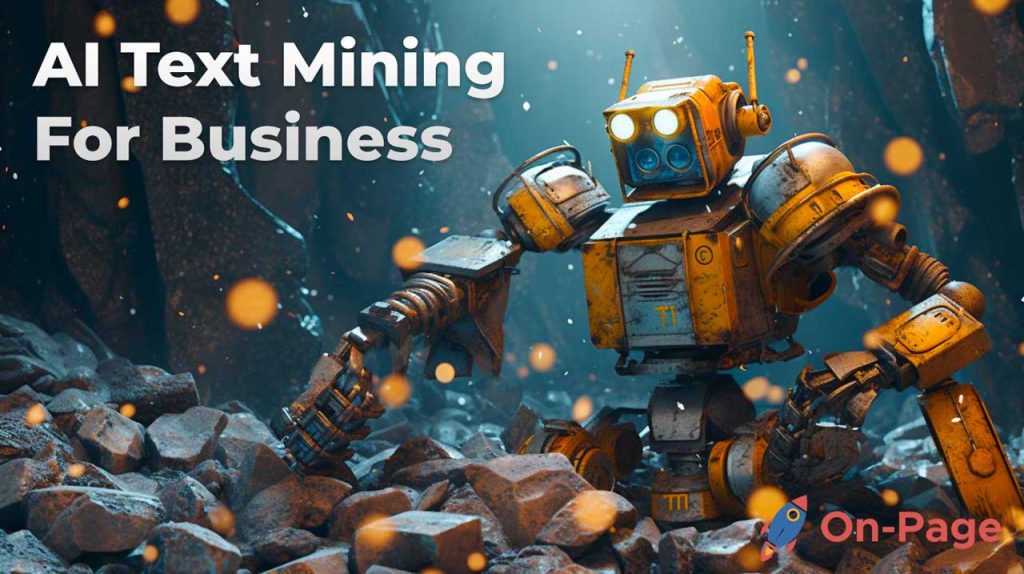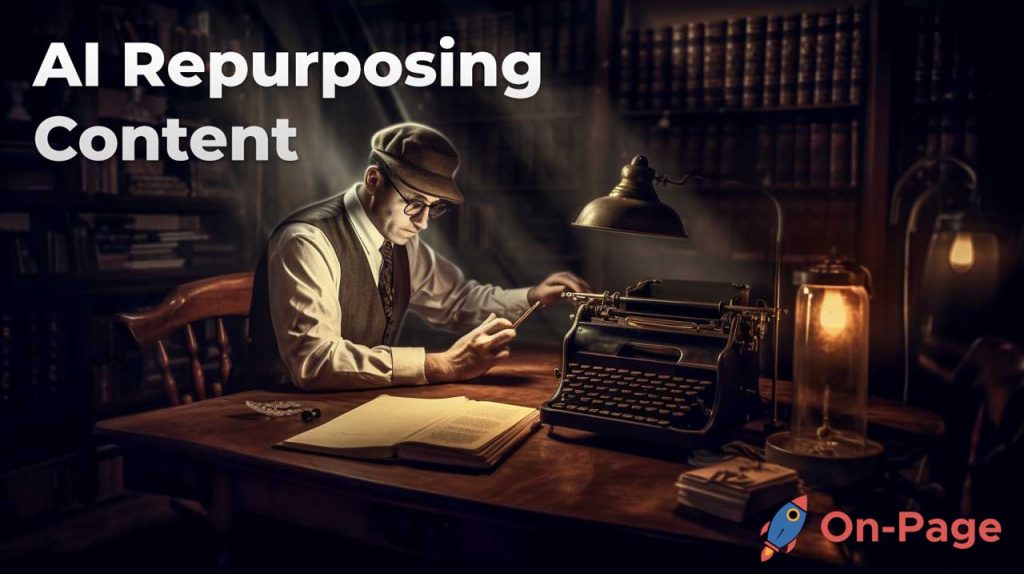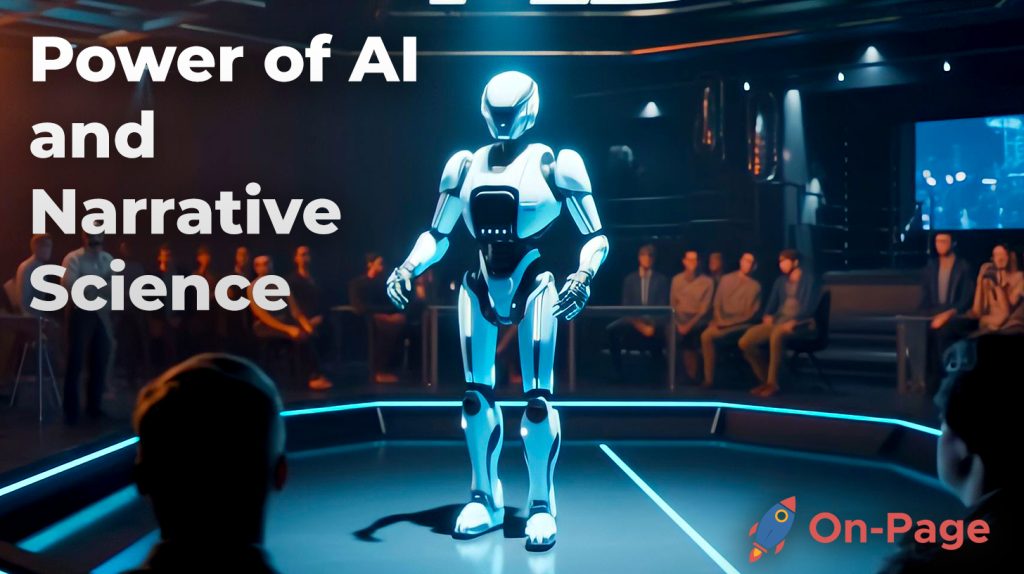AI content writing is much like a magic spell that crafts words into engaging phrases, sentences, and paragraphs automatically. This groundbreaking technology marries together natural language processing and machine learning algorithms to weave human-like language patterns. Contrary to common perception, AI does not mean an army of scary robots taking over our jobs. It’s more about a friendly helper who’s there 24/7 to assist us in producing consistent quality content, even while we sleep. Most interestingly, your blog could be the next big thing with this innovation aiding you along the way. So don’t delay, let’s embark on the journey of exploring it further.
Our AI content writer tool utilizes advanced natural language processing and machine learning algorithms to produce SEO-optimized articles with one click. It empowers businesses to scale their content output and drive brand awareness by generating prospecting emails, landing pages, or blog posts.

Concept of AI Content Writing
At its core, the concept of AI content writing revolves around the use of advanced technology to create written content. This technology harnesses the power of artificial intelligence, natural language processing (NLP), and machine learning algorithms to produce human-like language. Essentially, it enables the generation of articles, blog posts, product descriptions, and a wide array of written material with minimal human intervention.
Imagine having a virtual writing assistant that can understand and replicate human writing patterns to craft coherent and contextually relevant content. That’s precisely what AI content writing offers. Through NLP, AI can comprehend the nuances of language—picking up on everything from grammar rules to variations in tone and style. It’s like having a skilled writer at your disposal but with the added advantage of speed and scalability.
This technology doesn’t just regurgitate information; it has the capacity to learn and adapt to different writing styles and domains. It’s akin to an apprentice learning from a master wordsmith—a continuous process of refinement and improvement based on patterns it observes within various types of written content.
It’s important to mention that AI content writing isn’t limited to just generating text from scratch. It can also help in rephrasing existing content, optimizing it for different platforms, or even personalizing it for specific audiences. This versatility is what makes this technology so appealing to businesses and individuals looking to streamline their content creation processes while maintaining quality and relevance.
Let’s say you’re running an e-commerce business and need product descriptions for hundreds of items in your inventory. Instead of manually crafting each description, AI content writing can quickly generate compelling and unique descriptions tailored to each product, saving you time and effort while ensuring consistency and quality across your catalog.
Furthermore, AI content writing isn’t solely about churning out standardized text. It also has the potential to support creativity by assisting in brainstorming ideas, providing topic suggestions, or even contributing to the ideation process—acting as a catalyst for human creativity rather than a replacement for it.
Having established a comprehensive understanding of AI content writing’s core concept and its capabilities, let’s explore its practical applications and benefits.
Functionality of AI in Writing
When discussing the functionality of AI in writing, we’re delving into some pretty cool things. Let’s start with Natural Language Generation (NLG). Notice how unconventional it can feel when automated content pops up? Well, that’s where NLG comes in.
Natural Language Generation is what allows AI to write in a way that sounds more human-like. It utilizes complex algorithms to mimic natural language patterns and create coherent writing. This means that the text produced by AI content writing tools feels like it was written by a person instead of a machine.
Content optimization is another crucial aspect of AI in writing. We all understand the importance of content showing up on search engines, right? Well, that’s where AI steps in to help out. Not only does it suggest relevant keywords, but it also ensures that the content meets SEO best practices and improves readability. So, from suggesting the right words to making the entire piece easier to read, AI truly plays a major role in putting content out there for everyone to see.
For instance, AI can scour through a wide range of internet sources to find relevant information on a given topic. It doesn’t just find the information; it extracts key points and generates well-informed content based on the findings. It’s similar to a researcher who discards irrelevant sources and synthesizes helpful insights, isn’t it?
This kind of technology is not just beneficial for writing; it’s also changing the game for businesses by streamlining their content creation process.
These functionalities of AI are revolutionizing the way we approach writing, ensuring that our content is not only well-informed and optimized but also engaging and soundly presented to our audience.
Weighing Pros and Cons of AI Content Writing
Embracing AI content writing tools can be a game-changer for your blog, but it’s crucial to carefully consider the pros and cons before fully integrating them into your workflow. Let’s take a closer look at the advantages and drawbacks to make informed decisions about leveraging this technology.
Pros
-
Time Efficiency: Using AI-driven content writing tools can significantly boost productivity by effortlessly churning out content at a remarkable pace. With minimal human intervention, writers can focus on more strategic aspects of their work, saving valuable time that can be allocated to other critical tasks.
-
Consistency: One of the compelling advantages of AI content writing is its ability to maintain a consistent tone and style throughout the content. This ensures uniformity across various pieces, reinforcing brand identity and enhancing the overall coherence of published material.
-
Data-Driven Insights: AI provides data-driven recommendations for improving content performance, offering valuable insights into audience engagement, keyword optimization, and more. This analytical prowess equips content creators with actionable information to fine-tune their material for enhanced impact.
Cons
-
Lack of Creativity: While AI excels in generating large volumes of content efficiently, it may struggle to infuse a truly unique or imaginative touch into the material. The human element of creativity is often missed, resulting in content that might lack the distinct flair and originality that human writers bring to the table.
-
Quality Assurance: Human oversight plays a pivotal role in ensuring the nuanced touch and empathy present in well-crafted content. Without it, there’s a risk that the content produced through AI may lack the personalized touch and emotional resonance that resonates with readers.
-
Initial Investment: For some individuals or businesses, the initial cost of implementing AI content writing tools can pose a significant barrier. While the long-term benefits may outweigh this initial investment, it’s essential to carefully assess the financial implications before making a commitment.
Considering these key factors helps align content strategies with business goals while maintaining a balance between efficiency and quality. It’s crucial for bloggers to weigh these pros and cons based on their specific needs and objectives when deciding whether to integrate AI content writing into their workflow.
As we navigate this landscape of technological innovation driving content creation, let’s now explore methodologies aimed at further enhancing the quality of written material using AI tools.
Enhancing Content Quality with AI Tools
When it comes to creating top-notch content that captivates and informs your audience, AI tools offer a range of benefits that can elevate the overall quality of your writing. Let’s take a closer look at three key areas where AI tools shine in enhancing content quality.
Grammar and Spelling Checks
AI-powered grammar and spelling checks provide a robust safeguard against typos, misspellings, and grammatical errors in your content. By leveraging advanced language processing, these AI tools can thoroughly scan your writing for issues related to syntax, tenses, punctuation, and more. This ensures that your content is error-free, polished, and maintains a professional standard of quality.
AI offers timely corrections and suggestions, acting as a diligent proofreader that can catch intricate errors that may evade human eyes. Whether you’re an experienced writer or just beginning your content creation journey, having an AI tool at your disposal for grammar and spelling checks can significantly improve the accuracy and precision of your writing.
Style Enhancement
Crafting content with a consistent and engaging style is vital for capturing the attention of your readers. AI tools come equipped with the ability to analyze the style of your writing and offer valuable suggestions to enhance its readability, coherence, and overall impact.
These sophisticated style enhancement features can identify opportunities to improve sentence structure, eliminate redundancies, and ensure a smooth flow throughout the piece. By leveraging AI-powered insights, you can refine the tone and voice of your content to align with your brand’s identity while captivating your audience with compelling narratives and well-crafted prose.
SEO Optimization
One of the most valuable contributions of AI in content creation is its capability to optimize for search engine visibility. Through advanced algorithms and data analytics, AI tools can guide you in integrating relevant keywords seamlessly within your content while maintaining natural language flow. This SEO optimization strategy allows your content to rank higher on search engine results pages, increasing its discoverability and reach among your target audience.
AI-driven SEO insights also provide valuable recommendations for structuring meta descriptions, titles, headers, and other critical elements that influence search engine rankings. By harnessing the power of AI for SEO optimization, you can amplify the visibility and impact of your content while ensuring its alignment with current best practices in digital marketing.
By harnessing AI for grammar and spelling checks, style enhancement, and SEO optimization, you can elevate the quality of your content to new heights. These AI-driven capabilities equip you with the tools necessary to produce compelling, error-free content that resonates with your audience while adhering to industry-leading standards for readability and search engine performance.
The Great Debate: AI Writers versus Human Writers
The world of automated writing is full of promise and potential. When exploring the use of AI writers compared to human writers, there are many important aspects to consider. Let’s start with AI writers. One of the significant benefits of using AI to generate content lies in its ability to maintain a consistent tone and style across various pieces. This means that regardless of the quantity of content needed, it will all sound like it was written by the same person, creating a cohesive feel across your blog or website.
In addition, AI writers can produce vast amounts of content in significantly less time than human writers. While a human writer may take hours to research and craft an article, an AI writer can generate a comparable piece in just a fraction of that time. This efficiency is incredibly valuable for businesses looking to scale their content output quickly and consistently.
On the other hand, we have human writers, who bring a unique flair to their work. Their creativity is unmatched, adding a personal touch and originality that AI may struggle to replicate. While AI excels at following predefined rules and patterns, humans have the ability to infuse their writing with emotions, humor, and nuanced insights that can truly resonate with readers on a deeper level.
Instead of pitting AI writers against human writers as rivals, many businesses are finding success in combining the strengths of both. By blending the efficiency and consistency of AI-generated content with the creativity and human touch brought by skilled writers, companies can create a well-rounded content strategy that resonates with their audience while also maximizing productivity.
You can think of it like having a chef and a state-of-the-art cooking robot working side by side in the kitchen. The robot can whip up dozens of identical dishes in record time, while the chef adds their personal flair and creativity to each plate, making every meal an unforgettable experience. Together, they create a dining experience that neither could achieve alone.
So, while there’s no denying the benefits of AI-generated content, it’s equally important to recognize the irreplaceable value that comes from human creativity and insight. In today’s digital age, the debate isn’t about which type of writer is better; it’s about harnessing the strengths of each to elevate your content strategy to new heights.
As we peer into the future landscape of writing, let’s contemplate how AI is set to revolutionize the way we craft and consume content.
Anticipating the Future of Writing: The impact of AI
The impact of Artificial Intelligence on writing has piqued significant interest. As AI tools continue to mature, they are positioned to bring about substantial changes in how content is created, leading to a cascade of efficiencies and ethical considerations that cannot be overlooked. Let’s examine these potential impacts more closely.
Increase Efficiency
AI-powered writing tools have already demonstrated their ability to expedite the content creation process. Through the use of advanced algorithms and natural language processing, AI systems can assist writers in generating high-quality content in a fraction of the time it would take through traditional methods. This increased efficiency not only benefits individual writers by allowing them to produce more work in less time, but it also has broader implications for businesses and industries reliant on timely, well-crafted content.
For instance, an AI-powered writing assistant can help writers generate outlines, suggest improvements, identify errors, and even optimize content for SEO—all within a matter of minutes. This rapid feedback loop can significantly enhance productivity and enable a more streamlined writing process.
Transform Writing Workflows
In addition to increasing efficiency, AI is expected to transform the very workflows that writers have grown accustomed to. With the integration of AI tools into everyday writing tasks, from research and ideation to drafting and editing, the entire process of content creation is likely to become more data-driven and optimized.
Imagine a writer being able to access comprehensive literature reviews generated by AI algorithms in a matter of seconds or having an AI system provide personalized feedback on writing style and structure. These advancements have the potential to not only boost individual writing capabilities but also lead to a fundamental shift in how writers approach their craft.
Raise Ethical and Regulatory Questions
As AI assumes a more prominent role in content creation, it’s inevitable that discussions around ethical considerations, accuracy, and transparency will come to the forefront. The ability of AI systems to generate contextually relevant and coherent content quickly raises concerns about maintaining authenticity and originality in written work.
Furthermore, the growing reliance on AI in writing may prompt debates about intellectual property rights, plagiarism detection, accountability for errors made by AI systems, and the need for transparent disclosures when AI tools are involved in content creation.
It’s evident that while AI presents immense opportunities for enhancing writing productivity and quality, it also necessitates a careful examination of the ethical implications and regulatory frameworks required to ensure responsible use. The intersection of technology and writing demands continuous attention as we navigate this transformative landscape with both optimism and critical scrutiny.
Check out On-Page.ai




